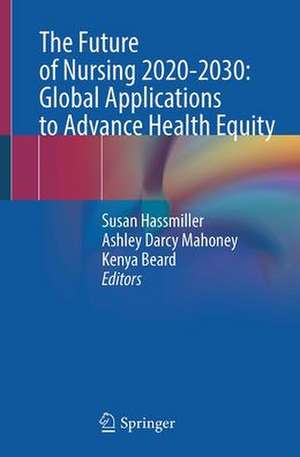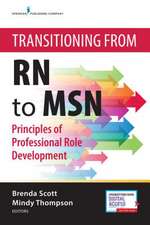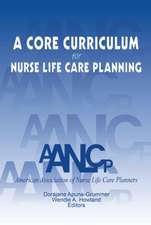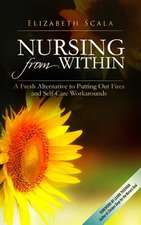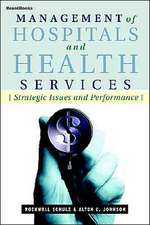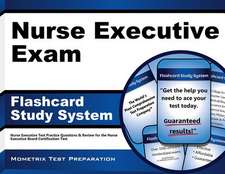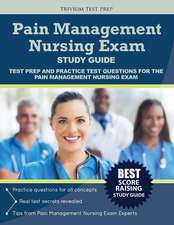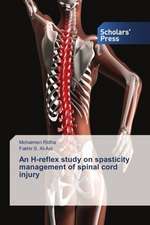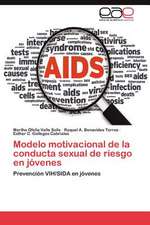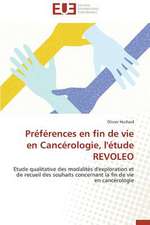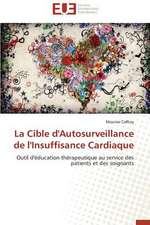The Future of Nursing 2020-2030: Global Applications to Advance Health Equity
Editat de Susan Hassmiller, Ashley Darcy Mahoney, Kenya Bearden Limba Engleză Paperback – 17 aug 2023
This book provides an application of the concepts and recommendations of The Future of Nursing 2020-2030: Charting a Path to Achieve Health Equity Report, a Consensus Study from the US National Academy of Medicine. It offers complementary guidance through tools, tips, examples and storytelling. As such this book, written by prominent international academics and nurse practitioners, offers program and policy recommendations for health equity. As the world’s largest and most trusted workforce, nurses are in a key position thus must step up to help address these inequities now. The recent pandemic has laid bare these inequities in ways that are stark and demanding of our attention. This book offers program and policy recommendations, along with case studies, designed to empower nurses to understand and ACT to improve health equity. This text provides nurses an opportunity to clearly see the need for an equitable, just, and fair society. There has never been a moreurgent call to action.
Preț: 450.93 lei
Preț vechi: 474.66 lei
-5% Nou
Puncte Express: 676
Preț estimativ în valută:
86.30€ • 89.76$ • 71.24£
86.30€ • 89.76$ • 71.24£
Carte disponibilă
Livrare economică 24 martie-07 aprilie
Livrare express 07-13 martie pentru 30.13 lei
Preluare comenzi: 021 569.72.76
Specificații
ISBN-13: 9783031297458
ISBN-10: 3031297458
Pagini: 197
Ilustrații: X, 197 p. 7 illus., 6 illus. in color.
Dimensiuni: 155 x 235 x 14 mm
Greutate: 0.36 kg
Ediția:1st ed. 2023
Editura: Springer International Publishing
Colecția Springer
Locul publicării:Cham, Switzerland
ISBN-10: 3031297458
Pagini: 197
Ilustrații: X, 197 p. 7 illus., 6 illus. in color.
Dimensiuni: 155 x 235 x 14 mm
Greutate: 0.36 kg
Ediția:1st ed. 2023
Editura: Springer International Publishing
Colecția Springer
Locul publicării:Cham, Switzerland
Cuprins
Foreword.- 1. The Goal for 2030: Health Equity.- 2. The Future of Nursing 2020-2030: Global Applications to Advance Health Equity.- 3. Diversifying the Nursing Workforce.- 4. Strengthen and Protect Nurses Well-being.- 5. Transforming Nursing Education: The Hong Kong Experience.- 6. Strengthening Nursing Education to Address Social Determinants of Health: Systems Leadership.- 7. Capitalizing on Nurses’ Potential to Improve Consumers’ Access to Care.- 8. Fully Support Nurses by Designing Better Payment Models.- 9. The Nurse’s Role in Achieving Health Equity in Disasters and Public Health Emergencies in Asia.- 10. Enabling Techquity in Nursing Practice: Informatics, Technology, and Innovation.- 11. Creating a Shared Agenda to Achieve Health Equity.- 12. Part 1: Research in Health Equity: Building the Evidence Base.- 12. Part 2: Research in Health Equity: Building the Evidence Base.- 13. Concluding Remarks: The Nurses’ Role in Achieving Health Equity Through Multisector Collaboration and Workforce Diversity.- Afterword.
Notă biografică
Susan Hassmiller, RN, PhD, FAAN is a national leader in nursing, health equity and leadership development. She has devoted her career to strengthening the nursing profession, improving population health and advancing health equity. During her 25 years at the Robert Wood Johnson Foundation (RWJF), she served as the Senior Adviser for Nursing and the Senior Scholar-In-Residence/Senior Adviser to the President at the National Academy of Medicine (NAM). She helped to lead the landmark reports at NAM on the Future of Nursing ─ the 2010 Future of Nursing: Leading Change, Advancing Health and The Future of Nursing, 2020-2030: Charting a Path to Achieve Health Equity. She also established and served as the director of the Future of Nursing: Campaign for Action, a nationwide initiative led by AARP, the AARP Foundation, and RWJF, to transform health and health care through nursing to build a healthier America. Dr. Hassmiller has held leadership positions in some of the nation’s most prominent health care organizations. She served on the Board of Governors of the American Red Cross, is an elected member of the National Academy of Medicine, and is a fellow in the American Academy of Nursing, where she holds the Living Legend status. She sits on other advisory committees and boards, including the Hackensack Meridian Health System, UnitedHealth Group, Carrier Clinic, the Nurses on Boards Coalition, and the University of North Carolina School of Nursing. She has received many awards and four honorary doctorates, including the Florence Nightingale Medal, the highest international honor given to a nurse by the International Committee of the Red Cross.
She is a Hudson/ICF certified Executive/Leadership Coach and Founder and Principal of Sulu Coaching and Consulting (www.sulucoaching.com) with a practice focused on nurses and other health care leaders. She also holds a certificate in team coaching from the United Kingdom's Team Coaching Studio. Dr. Hassmiller lives in Cary, North Carolina, with her husband and co-founder of Sulu Coaching, and close to her extraordinary grandchildren.
Ashley Darcy-Mahoney, PhD, NNP, FAAN, is a professor and chair at the George Washington School of Nursing. She is a neonatal nurse practitioner and researcher, and has worked throughout her career to advance nursing research, education and practice, with a focus on neonatology, infant health and developmental pediatrics. Her research has led to the creation of programs that improve health and developmental outcomes for at-risk and preterm infants. As a professor of nursing and the director of infant research at George Washington University’s Autism and Neurodevelopmental Disorders Institute, Dr. Darcy-Mahoney advances the body of research in infant health and developmental outcomes in high-risk infants with a focus on understanding the early brain and development trajectories in this population. This includes working closely with parents, teachers, nurses, other clinical colleagues, and government officials to bring both sound science and the reality of family lives in the development of new models, which ultimately influence health policy. Dr. Darcy-Mahoney was a lead member of the team that conceptualized and launched the “Talk with me Baby” and Háblame Bebé program that uses nurses as a workforce to teach parents about how early language exposure is an important predictor of future academic achievement beyond a variety of socioeconomic indicators such as parental income, level of parental education, or ethnicity. This program has proven how science can inform both policy and system-level changes to reduce health disparities in young children. She has been funded by the NIH, HRSA, and multiple foundations. Dr. Darcy-Mahoney is a Robert WoodJohnson Foundation (RWJF) Nurse Faculty Scholar Alumna and most recently spent a year at the National Academy of Medicine as the Nurse Scholar in Residence. She is a fellow of the American Academy of Nurses, a 2017 Josiah Macy Scholar, and has earned numerous awards, including the 2014 March of Dimes Nurse of the Year, and the Lillian Sholtis Brunner Award for Innovation from her alma mater, the University of Pennsylvania.
Kenya V. Beard, EdD, AGACNP-BC, CNE, ANEF, FAAN, is the Associate Provost for Social Mission and Academic Excellence at Chamberlain University. She is a 2012 Macy Faculty Scholar and nurse leader whose research has improved learning environments and strengthened the graduation of racially and ethnically diverse providers. In her former role as Senior Fellow at the Center for Health Policy and Media Engagement at George Washington University School of Nursing, she wrote blogs and co-produced health care disparity segments for HealthCetera, on WBAI-FM for an audience of over 400,000 diverse listeners.
Dr. Beard has consulted with numerous schools across the country on ways to design a multicultural curriculum that advances health equity. She led the New York State Action Coalition in constructing the state’s 2014 Workforce Diversity Toolkit and contributed to the National League for Nursing’s (NLN) 2016 Diversity Vision Statement. She co-created the Josiah Macy Foundation’s 2018 ground-breaking document, Improving the Environment for Learning in the Health Professions. She provided the NLN’s inaugural webinar, Leading Conversations that Center on Racism and her workshop, “Leading in a Race-Conscious Society,” was supported by the Harvard Macy Institute’s Program for Educators in the Health Professions. Her efforts have strengthened racial diversity in nursing.
Dr. Beard is a fellow of the New York Academy of Medicine, American Academy of Nursing, and Academy of Nursing Education. She served as an advisor for the New York Academy of Medicine’s National Health Equity Scholars Network and was recently appointed by the National League for Nursing to the American Nurses Association’s National Commission to Address Racism in Nursing. She is Chair of the American Academy of Nursing’s Diversity and Inclusivity Committee and the New York State Board for Nursing. She also serves as an editorial board member for the American Journal of Nursing.Textul de pe ultima copertă
This book provides an application of the concepts and recommendations of The Future of Nursing 2020-2030: Charting a Path to Achieve Health Equity Report, a Consensus Study from the US National Academy of Medicine. It offers complementary guidance through tools, tips, examples and storytelling. As such this book, written by prominent international academics and nurse practitioners, offers program and policy recommendations for health equity. As the world’s largest and most trusted workforce, nurses are in a key position thus must step up to help address these inequities now. The recent pandemic has laid bare these inequities in ways that are stark and demanding of our attention. This book offers program and policy recommendations, along with case studies, designed to empower nurses to understand and ACT to improve health equity. This text provides nurses an opportunity to clearly see the need for an equitable, just, and fair society. There has never been a more urgentcall to action.
Caracteristici
Serves to enhance the translation of Future of Nursing 2020-2030: Achieving a Path to Health Equity NAM report Describes how nurses are in unique positions to address the root causes of poor health Explores the goals that can be achieved by 2030
